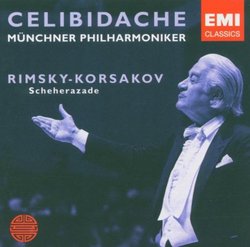| All Artists: Recorded Sound, Nikolai Rimsky-Korsakov, Sergiu Celibidache, Munich Philharmonic Orchestra Title: Rimsky-Korsakov: Scheherazade Members Wishing: 1 Total Copies: 0 Label: Angel Records Original Release Date: 1/1/2005 Re-Release Date: 7/18/2005 Album Type: Import Genres: Special Interest, Classical Style: Symphonies Number of Discs: 1 SwapaCD Credits: 1 UPC: 724355785329 |
Search - Recorded Sound, Nikolai Rimsky-Korsakov, Sergiu Celibidache :: Rimsky-Korsakov: Scheherazade
 | Recorded Sound, Nikolai Rimsky-Korsakov, Sergiu Celibidache Rimsky-Korsakov: Scheherazade Genres: Special Interest, Classical
|
Larger Image |
CD Details |
CD ReviewsSlow Celibidachean tempi that work, for once Yi-Peng | Singapore | 03/24/2007 (4 out of 5 stars) "Although Celibidache did not favour making recordings at all, we should be very very thankful that EMI, Celibidache's estate and the Bavarian Radio are making radio transcripts of his concerts available for us to hear on CD. I chanced upon this version of Scheherazade by accident while looking at the EMI Celibidache Tchaikovsky CDs. Celibidache may be better known for his Bruckner performances, but this version of Scheherazade is a superb example of his art. I'm mindful that the slow tempi that he adopts goes against the received way of performing the piece. However, in the case of his Tchaikovsky and this Scheherazade, Celibidache in his more expansive speeds unearths nuances that often tend to get buried in many traditional performances.
The average listener might probably be used to the taut, propulsive speeds of Reiner and Beecham in their performances of the work. Celibidache's rendition of this well-loved Russian symphony is a different creature altogether, and the listener can hear this in the depiction of the treacherous Sultan in the opening bars. One might be easily put off at the beginning of the performance but once the anonymous violinist sounds Scheherazade's theme Celibidache takes us on a seductive and sensuous 54-minute long magic carpet ride through the Arabian Nights. The advantage of this version is that Celibidache allows us to hear the work in its structure, so that one section flows naturally to the next. When one continues listening to the performance, the listener can hear how Celibidache sustains the tempi of the first movement while keeping the music interesting, and portraying the unchanging nature of the two moods of the sea. This kind of approach suits the Kalandar Prince scherzo-movement well, with so many disjointed episodes. Although this movement runs to 15 minutes as opposed to 11 or 12, the various wind soloists (especially the clarinet and bassoon) seem to better relish their solos and add mystery and fatalism to them, rather than play them as if they want to be over and done with their part. In the slow third movement, depicting a love scene between the young prince and the young princess, the Celibidache approach serves the music very well. Apart from the languorous tempi, he conjures up a sweltering and velvety cushion of sound that ably depicts the lush surroundings of this love scene. The wind soloists, especially the clarinetist, seem to relish their part here, and this movement allows us to hear the similarities between the two principal themes when played at the same tempi. Once this is done Celibidache caps the performance with a Baghdad Festival finale that springs lightly even at his chosen tempo. It may not be like the big bang of the traditional performance. I find that the build-up to the climactic shipwreck scene is noteworthy because it's natural and sustained, before it dissipates into the soft closing pages that are done so well. The spacious speeds in this version may not be to everyone's liking, but this performance seems to flow naturally and effortlessly from one section to the next. The Munich Philharmonic seemed to have fallen under his spell at this concert, and eagerly played this work with all its heart, lending weight to the more powerful sections of the work when called for. And perhaps it helps that the performance helps hang the disparate episodes of the work together as one. I would recommend this Scheherazade recording even despite the minor reservations that most listeners have. In most people's minds it wouldn't displace any of the other recordings I've mentioned above. But Celibidache allows us to discover new felicities in his performance of the work, and as such his insightful performance is unique in its own way. And I think that perhaps I like this performance because of the nuances that Celibidache unearths in his approach. As a side note, I wonder when EMI will release its next batch of Celibidache CDs, and in particular the Celibidache/Munich Philharmonic Dvorak New World. It would make a great companion piece and we can hear Celibidache revealing the tensions of the work that so often tend to get lost in many a performance." |

 Track Listings (5) - Disc #1
Track Listings (5) - Disc #1